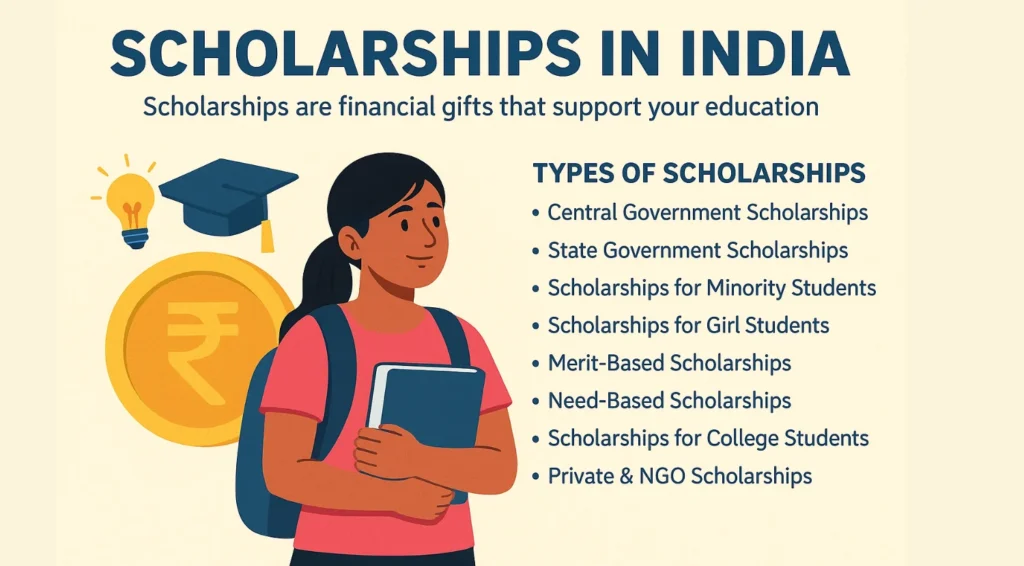Do you dream of a bright future? Does the worry of college fees sometimes hold you back? You are not alone. Many students in India face this challenge. But here is the good news. You can find help. Scholarships are financial gifts that support your education. This article is your starting point. It is a complete guide to finding the right scholarship. We will cover all the major types of scholarships available in India.
What Is a Scholarship?
A scholarship is financial support given to students to help them continue their education. It is not a loan, so you don’t have to pay it back. Scholarships are awarded based on different criteria such as merit (marks), financial need, category (SC/ST/OBC/Minority), gender, or field of study.
Scholarships do more than just pay your fees.
- Reduce Financial Burden: They ease the pressure on you and your family.
- Focus on Studies: With less money stress, you can concentrate on learning.
- Build Your Profile: Winning a scholarship looks excellent on your resume.
- Gain Recognition: It is a reward for your hard work and talent.
Who Can Apply for Scholarship in India?
Most scholarships are open to Indian citizens studying in recognized schools, colleges, or universities.
Eligibility criteria usually depend on:
- Family income (usually below ₹2–8 lakh per year)
- Academic performance (marks or rank)
- Category (SC/ST/OBC/Minority/Girls)
- Course or stream (Engineering, Medicine, Arts, etc.)
It’s important to read the official notification of each scholarship before applying.
Types of Scholarships in India
There are thousands of scholarships available for Indian students. These can be grouped into different categories based on who provides them or who can apply.
1. Central Government Scholarships
The Central Government offers many scholarships through its ministries. These are provided by the central and state governments. They usually cover education fees, living expenses, and books. Some popular government scholarships are: Some popular ones include:
| Scholarship Name | Official Source |
|---|---|
| National Scholarship Portal (NSP) Scholarships | CLICK HERE |
| Prime Minister’s Scholarship Scheme (PMSS) | CLICK HERE |
| INSPIRE Scholarship for Science Students | CLICK HERE |
| AICTE Scholarships for Technical Students | CLICK HERE |
2. State Government Scholarships
Each state in India runs its own scholarship schemes for students belonging to that state. These scholarships are often available for school, college, and professional students.
| Scholarship Name | Official Source |
|---|---|
| West Bengal – Swami Vivekananda Merit-cum-Means Scholarship | CLICK HERE |
| Maharashtra – Rajarshi Shahu Maharaj Scholarship | CLICK HERE |
| Uttar Pradesh – Pre-Matric and Post-Matric Scholarships | CLICK HERE |
3. Scholarships for Minority Students
Minority communities like Muslims, Christians, Sikhs, Buddhists, Jains, and Parsis can apply for these schemes. Examples include the Maulana Azad National Fellowship and Pre-Matric/ Post-Matric Scholarships for Minorities.
| Scholarship Name | Official Source |
|---|---|
| Pre-Matric Scholarship for Minorities | CLICK HERE |
| Post-Matric Scholarship for Minorities | CLICK HERE |
| Merit-cum-Means Scholarship for Professional and Technical Courses | CLICK HERE |
4. Scholarship for Girl Students
To encourage girls’ education, many organizations provide special scholarships for female students.
| Scholarship Name | Official Source |
|---|---|
| CBSE UDAAN Scheme | CLICK HERE |
| Kiran Girls Scholarship | CLICK HERE |
| INSPIRE Scholarship for Science Students | CLICK HERE |
| AICTE Scholarships for Technical Students | CLICK HERE |
5. Merit-Based Scholarship
These scholarships reward students who perform well in academics or entrance exams. Many universities and private organizations also offer merit awards to top scorers.
| Scholarship Name | Official Source |
|---|---|
| ntse (national talent search examination) | CLICK HERE |
| KVPY (Kishore Vaigyanik Protsahan Yojana) | CLICK HERE |
| L&T Build India Scholarship | CLICK HERE |
| Tata Scholarship for Indian Students | CLICK HERE |
6. Need-Based Scholarship
These are meant for students from economically weaker sections, regardless of marks.
| Scholarship Name | Official Source |
|---|---|
| NSP Need-Based Scholarships | CLICK HERE |
| LIC Golden Jubilee Scholarships | CLICK HERE |
| Kotak Education Foundation Scholarship | CLICK HERE |
7. Scholarship for College Students
College-level scholarships are available for undergraduate (UG), postgraduate (PG), and professional courses.
| Scholarship Name | Official Source |
|---|---|
| AICTE PG Scholarship for GATE Qualified Students | CLICK HERE |
| UGC NET JRF Fellowship | CLICK HERE |
| Sitaram Jindal Foundation Scholarship | CLICK HERE |
8. Private & NGO Scholarship
Many private companies and NGOs offer scholarships as part of their social responsibility programs. Examples include Tata Trust Scholarships, Reliance Foundation Scholarship, and Aditya Birla Scholarship.
| Scholarship Name | Official Source |
|---|---|
| Reliance Foundation Scholarship | CLICK HERE |
| HDFC Educational Crisis Scholarship | CLICK HERE |
| Aditya Birla Scholarship | CLICK HERE |
| Narotam Sekhsaria Scholarship | CLICK HERE |
What Are the Most Common Selection Criteria?
Committees look at a mix of the following:
- Academic Merit: Your marks in the previous qualifying exam (like Class 10, 12, or graduation).
- Financial Need: Your family’s annual income, as shown by an income certificate.
- Category: Belonging to a specific group (SC, ST, OBC, EWS, Minority) to promote educational equality.
- Course/Field of Study: Pursuing a specific stream like Engineering, Medicine, Arts, or Diploma courses.
- Institution: Studying in a government school/college or a recognized private institution.
- Extra-curricular Achievements: Excellence in sports, music, debate, or social work.
How to Apply for Scholarship in India?
Applying for scholarships in India is easy if you follow the steps carefully:
- Visit the official website – For most government scholarships, visit the Official website of the respective scholarship portal.
- Register as a new user – Fill in your basic details like name, email, and Aadhaar number.
- Select your scholarship scheme – Choose the one that matches your eligibility.
- Upload required documents – Marksheets, income certificate, caste certificate, and bank details.
- Submit and track your status – You can check the progress of your application online.
Documents Required
You must keep these documents ready while applying:
- Recent passport-size photograph
- Aadhaar card
- Income certificate
- Caste or community certificate (if applicable)
- Previous year’s mark sheet
- Bank account details (linked with Aadhaar)
- Bonafide student certificate

FAQs
1. I’m an average student. Can I really win a scholarship?
Absolutely, yes! This is the most important myth to bust. Scholarships aren’t just for top-rankers. Many are designed for:
- Financial Need: If your family income is below a certain level.
- Specific Categories: For students from SC, ST, OBC, or Minority communities.
- Unique Talents: For skills in sports, arts, music, or even community service.
- Specific Courses: For students pursuing certain fields like engineering, nursing, or design.
2. What is the biggest mistake students make when applying?
The biggest mistake is missing the deadline. Scholarship portals close exactly on time, and no exceptions are made.
Other common mistakes include:
- Filling the form with typos or wrong details.
- Not reading the eligibility criteria carefully.
- Uploading blurry or incorrect documents.
- Waiting for the last day, leading to website crashes.
3. Where can I find 100% genuine scholarship information? (And how do I avoid scams?)
Stick to official and trusted sources to stay safe.
Trusted Sources:
- Government: The National Scholarship Portal (NSP) and state government education websites.
- Universities: The official website of your current or target college.
- Reputable Companies: The official “CSR” or “Careers” section of well-known corporate websites.
Red Flags (Signs of a Scam):
- Any request for an “application fee.” Genuine scholarships are free to apply.
- Emails or calls asking for your password or OTP.
- Promises of a “guaranteed” scholarship.
4. Can I apply for more than one scholarship at the same time?
Yes, and you definitely should! Applying to multiple scholarships dramatically increases your chances of getting financial aid. You can apply for as many as you are eligible for.
For example, you could apply for:
- A merit-based scholarship from your university.
- A need-based scholarship from the government.
- A category-based scholarship for your community.
Just ensure you meet the specific criteria for each one.
5. My family’s income is just above the limit for a need-based scholarship. What are my options?
Don’t lose hope. Many opportunities remain.
Look for these instead:
- Merit-Cum-Means Scholarships: These consider both your marks and your financial background, and often have a higher income ceiling.
- Merit-Based Scholarships: Focus on improving your grades and applying for awards based purely on academic performance.
- University-Specific Awards: Many private colleges offer their own scholarships and fee waivers to attract students.
- Private Trusts & Corporate Scholarships: These often have their own unique criteria beyond just family income.
The post Scholarship in India 2025: Complete Guide for School and College Students first appeared on IndiaExamAlert.

